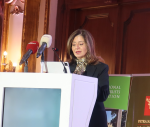You are here
The US needs to reach awareness about Iran
Oct 18,2017 - Last updated at Oct 18,2017
The award of this year’s Nobel Peace Prize to the Campaign to Abolish Nuclear Weapons coincided with rising tensions on the Korean Peninsula and in this region over US President Donald Trump’s alarming pronouncements.
On the one hand, he threatened Pyongyang with “fire and fury” in response to statements made by North Korea, a nuclear weapon state, that it could strike the US or Western Europe with missiles carrying nuclear warheads.
On the other hand, he has repeatedly said that he intends to subvert the 2015 six-power agreement with non-nuclear weapon Iran, providing for strict limitations on its nuclear programme, to prevent Tehran from getting the bomb (which it has renounced) in exchange for lifting punitive sanctions.
Campaign Director Beatrice Fhin argued that the election of the erratic Trump “has made a lot of people feel very uncomfortable with the fact that he alone can authorise the use of nuclear weapons”.
She said the nine nuclear-armed states — the US, the UK, France, China, Russia, India, Pakistan, Israel and North Korea — “can’t threaten to indiscriminately slaughter hundreds of thousands of civilians in the name of [their own] security”.
All nine boycotted negotiations on a treaty banning nuclear weapons, approved by 122 non-nuclear states in July.
The Nobel committee justified its choice by saying: “The risk of nuclear weapons being used is greater than it has been for a long time [and there is] a real danger that more countries will try to procure nuclear weapons.”
It called on the nine to eliminate the 15,000 nuclear weapons in their arsenal.
Coinciding with July’s failed attempt to ban nuclear weapons, Trump, reportedly, told a gathering of national security advisers that he wanted to increase the number of nuclear warheads in the US arsenal from the current 4,000 to 32,000, the figure for the 1960s, when the stockpile was at its maximum.
Although this report has been dismissed as “fake news” by Trump and his Defence Secretary James Mattis, if he were to go ahead with this idea, Trump would violate non-proliferation agreements signed by the US and a host of other countries.
Trump would also have to overcome opposition from the three generals in his entourage, anti-nuke groups and the international community.
Trump, apparently, made his remark about increasing US nuclear weapons without proper briefing or consideration. This is characteristic of the man who thinks he knows everything and does not need to consult underlings.
When he deemed the report “fake news”, he said he would upgrade US weaponry, a process which has gone on continuously since reductions were made.
This is nothing new.
Trump’s unwise assertion prompted US Secretary of State Rex Tillerson to call him a “moron”, a remark seen as fitting among Trump’s many critics and detractors.
This enraged Trump who is becoming increasingly belligerent and unstable.
Former president Barack Obama rightly asked voters during last year’s presidential election campaign if they trusted Trump’s finger on the nuclear trigger.
The revelation that Trump has called for a dramatic increase in the number of nuclear weapons in the US arsenal and his repeated insistence on the revocation of the nuclear deal with Iran has made it clear to North Korea’s leader Kim Jong-un that the US cannot be trusted.
Pyongyang has long based its quest for nuclear weapons and missiles to deliver them on the aim of deterring a US invasion of North Korea in order to achieve regime change.
Pyongyang looks to the examples of Iraq’s Saddam Hussein and Libya’s Muammar Qadhafi, who renounced nuclear weapons and were overthrown by Western powers.
Saddam halted work on nuclear weaponry in 1991 while Qadhafi agreed to dismantle his country’s weapons of mass destruction programme in December 2003, following the US war on Iraq. The latter was ousted and murdered in 2011 by rebels aided by the US and Europe.
Trump’s irresponsible fulminations against the nuclear deal with Iran — the Joint Comprehensive Plan of Action (JCPOA) — are threatening US policies in this region.
Trump and like-minded anti-Iran types in the administration and Congress refuse to recognise that the US needs Iran’s help to wind down the conflicts in this region and Afghanistan.
The US and Iran are partners in the fight against Daesh and Al Qaeda in Iraq and Syria. In the campaign to liberate Iraqi towns and cities, the US-backed Iraqi army has depended on the Popular Mobilisation Units made up of Iran-sponsored Shiite militias.
The head of Iran’s elite Quds Force, Qassem Suleimani, has also advised Iraq’s high command on the conduct of the battle against Daesh.
The Popular Mobilisation Units can be expected to play a major role in ensuring that Daesh and Al Qaeda do not rise again in Iraq.
While the US has backed armed insurgents opposed to the Syrian government, Washington has, again, found itself on the same side as Iran which supports Damascus in the offensive against Daesh.
Unless the cult is defeated in both Iraq and Syria, it will soon revive and, once again, threaten the region.
Once Daesh is defeated, the US will focus on undermining Iran’s influence in Iraq and Syria. This will not happen if the Trump administration continues antagonistic trumpeting.
Iran’s hardliners and moderates, already united to resist Trump’s threats, will defend influence gained through the expenditure of blood and treasure.
Trump’s only intelligent option is to recognise the rise of Iran due to the 2003 US hand-over of Iraqi governance to pro-Iranian Shiite fundamentalists and Iran’s intervention in the Syrian conflict in which Washington has been involved on the side of the insurgents who are losing due to Iranian and Russian backing for the government.
Iran can also be a spoiler of US policies in Yemen — where it is supporting an ill-advised, devastating Saudi-led war — and Afghanistan — where the US is still battling the Taliban, 16 years after invading that country following Al Qaeda’s attacks on New York and Washington in September 2001.
The US has still to accept that Iran is a power in this region because it is geographically part of the region.
Iran has a population of 80 million people, largely educated, and oil revenues to project its reach around the region.
By contrast, the US is operating from a distance or from military bases here and there and is deeply disliked by the Arabs as a destructive neocolonial power.












